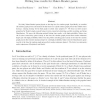168 search results - page 15 / 34 » Matching as a non-cooperative game |
121
click to vote
ICAPR
2005
Springer
15 years 7 months ago
2005
Springer
There is need for more formal specification of recognition tasks. Currently, it is common to use labeled training samples to illustrate the task to be performed. The mathematical ...
CORR
2007
Springer
15 years 1 months ago
2007
Springer
We show that the Brier game of prediction is mixable and find the optimal learning rate and substitution function for it. The resulting prediction algorithm is applied to predict...
135
click to vote
SAGT
2010
Springer
15 years 9 days ago
2010
Springer
Abstract. One reason for wanting to compute an (approximate) Nash equilibrium of a game is to predict how players will play. However, if the game has multiple equilibria that are f...
103
click to vote
CORR
2010
Springer
15 years 2 months ago
2010
Springer
We study Maker-Breaker games played on the edge set of a random graph. Specifically, we consider the random graph process and analyze the first time in a typical random graph proc...
115
click to vote
PCM
2009
Springer
15 years 8 months ago
2009
Springer
Text facilitated sports video analysis has achieved extensive success in video indexing, retrieval and summarization. A commonly adopted basis in previous work is the separate alig...


